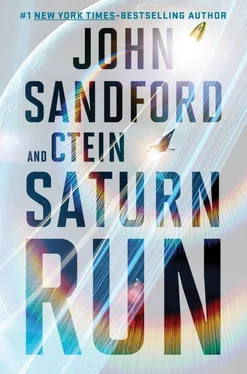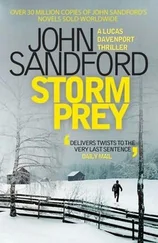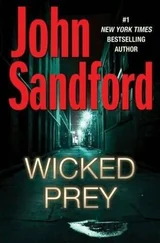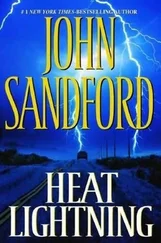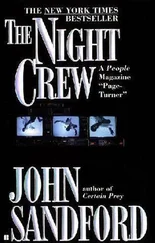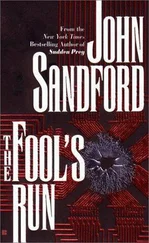Six months into the job, Sandy’s insouciance had begun to seriously wear on Fletcher, just as Fletcher’s pomposity wore on Sandy. Sandy couldn’t be fired—there was all that Darlington money out there. Fletcher did the next best thing: gave him make-work.
Sandy recognized the job for what it was, and so went surfing.
When he wasn’t surfing, and partly in revenge for the treatment he got from the Real Scientists, he was screwing his way through the department. So far, he’d had hasty relationships with seven of the seventeen single women in the research group. (One of the Young Astro Stars, holding court in the cafeteria, pointed out that both seven and seventeen were prime numbers, and if Sanders wanted to stay on course, and yet maintain that kind of fine arithmetical symmetry, he’d have to screw four more women, since eight, nine, and ten were not prime. A woman who overheard the comment said the Star’s erratic sense of humor was part of the reason that Sandy had managed to sleep with seven out of seventeen, while the Star was striking out. She added, before picking up her lunch tray, “You fuckin’ dweeb.”)
And the women who’d slept with young Sanders confessed to each other, over hushed lunches, that while it was possibly true that Sandy might not match their knowledge of advanced physics and astronomy, sex was one area in which young Darlington definitely knew how to change a tire. Even, on occasion, multiple tires.
So virtually all his male colleagues, and a considerable (but shrinking) fraction of the female contingent, loathed him. Not that their loathing amounted to much: rudeness, mostly. They cut him out of grad student meetings.
Which made what happened all that much worse.
The interns’ room was a windowless hall, a nearly perfect cube of yellow limestone, divided into sixteen tiny cubicles; it had once been a storage room.
There were four interns present when Sandy ambled through the door. Three of them were peering at computer screens, and the fourth had her head down on her desk. She snored.
“Man, you smell like pachuca weed,” one of the interns, Ravi Chandrakar, said, as Sandy passed.
“Yeah, well, you smell like chili-cheese wieners. Given a choice, I’d rather smell like dope,” Sandy said.
“That’s the goddamn truth,” said another of the interns. “You keep eating those fuckin’ chili-cheese wieners, I’m gonna drag you to a window and throw you the fuck out.”
“Yeah, right, like where are you gonna find a window?”
The sleeping woman stirred, but didn’t awaken; the hostility had been simulated.
Sandy took his desk, touched the ID pad with his index finger, and the screen popped up.
He had been assigned to nursemaid Chuck’s Eye. The work was not hard. Or, maybe it was, but the computers did it. Sandy was the human eye that double-checked the results, to make sure the computers hadn’t missed anything unusual enough that it fell outside their analysis parameters. And the computers would tell him if that happened, so he could alert a Real Scientist.
The current program didn’t even hold the possibility of uncovering an event of astronomical interest: it was a calibration run on a new camera module. The idea was to take a well-known, and therefore uninteresting, part of the sky and make simultaneous exposures with all the different-wavelength cameras. Superimpose them and make sure that all the little points of light aligned properly and that the spectra looked more or less normal.
Repeat that three times, at half-hour intervals, and make sure that those later stacks of images matched the first, so you knew that the tracking was good. Nothing in deep space changed rapidly, unless you were so amazingly lucky as to catch a supernova or gamma-ray burst, and the computers would recognize those things. Absent such a rarity, the four sets of stacked images should match up pixel for pixel.
It was a job made for a computer. But Chuck’s Eye was a seriously valuable resource, and the Real Scientists felt the same way about their time, so it fell upon Sandy to babysit it. It seemed the perfect place to park a guy who’d written a senior thesis on “Movement Art as Planetary Drive.”
To do his job, Sandy was required to push three keys on a computer keyboard to bring up a string of associated photos, then put his finger on the screen and drag them together, and then pinch them, and the computer would compare the images to see if anything untoward might be happening.
All this, in revenge for being a rich, good-looking, unemployable arts major. And, of course, that whole serial womanizer thing… to say nothing of the way he ran his mouth.
So he brought up his computer, put his feet on the desk, pulled open a drawer, unfolded a practice-guitar neck, and began running scales; it was a mindless activity that allowed him to maintain his left-hand calluses while he formulated his next move on McGill. He’d been doing that for twelve seconds when the computer pinged and produced a line of type:
CRITICAL ANOMALY.
That hadn’t happened before. Dating rituals forgotten for the moment, Sandy put the guitar-neck aside and frowned. “Hi-ho, Watson, the game’s afoot.” He touched a menu that had popped up on the side of the screen, selecting the word “Describe.”
The computer said:
OBJECT DECELERATING.
Sandy dropped his bare feet to the floor and said to the computer, “It’s not just afoot, Holmes, it’s a whole fucking leg.”
“What’s that?” Chandrakar asked over a cubicle wall.
“Talking to myself. It’s the pachuca weed.”
“Told ja.”
____
Celestial objects do not decelerate, not even for Harvard graduates.
Sandy touched another menu item—Report—and the computer prepared a short report. The computer said:
THE OBJECT IS REAL ~ 99%.
THE OBJECT IS BETWEEN ONE AND 10 KM IN LENGTH.
THE OBJECT IS BETWEEN ONE AND FOUR KM IN WIDTH.
THE OBJECT IS EMITTING MOST STRONGLY IN THE DEEP ULTRAVIOLET.
THE OBJECT IS EMITTING HYDROGEN GAS AT UNKNOWN VOLUME.
THE OBJECT IS DECELERATING.
What the holy hell? When had the test series been photographed? He checked: okay, mid-morning, about three hours earlier. About the time he should have gotten to work. Sandy tapped a few more keys, and the computer ran its virtual clock forward to the present time, extrapolating where the object would be if its behavior remained unchanged.
He checked the status board for all the SSO’s scopes and saw that none of them were in use at the moment. The various researchers had held off on scheduling observations in case the servicing of the SSO took longer than expected. Good. He walked down the hall and looked in Fletcher’s office, which was empty, along with most of the others.
Ah, he thought. The group meeting, to which he wasn’t invited. Okay, no witnesses.
Sandy punched in Fletcher’s authorization—he paid more attention to computer use than his coworkers suspected—and told Chuck’s Eye to grab another set of comparison frames. The anomaly was probably a camera failure in that new module, he thought. Really couldn’t be anything else.
He thought about it for another moment, checked down the hall again, and then retargeted the Medium Eye, which had never given them any trouble, to the extrapolated coordinates. He instructed the Medium Eye to send down three short-exposure images separated by five-minute intervals. That should confirm that nothing was at the target site: both cameras wouldn’t be wrong, at least not the same way.
But what was that thing the computer said, about “the object is real ~ 99%”?
Real? And decelerating?
Ten minutes to kill. He went and made fresh coffee, one of his assigned tasks. Anything that kept him from watching the clock. There must be a glitch. A major glitch. Because if it wasn’t, he’d found an impossibility. “The object is decelerating?”
Читать дальше
